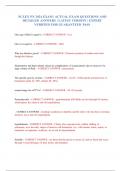NCLEX PN 2024 EXAM | ACTUAL EXAM QUESTIONS AND
DETAILED ANSWERS | LATEST VERSION | EXPERT
VERIFIED FOR GUARANTEED PASS
One cup of fluid is equal to - CORRECT ANSWER - 8 oz
One oz is equal to - CORRECT ANSWER - 30ml
Why are diuretics given? - CORRECT ANSWER - Promote excretion of sodium and water
though the kidneys
Hypotension and hypovolemic shock are complications of a paracentesis due to removal of a
large volume of fluid. - CORRECT ANSWER - paracentesis
The specific gravity of urine - CORRECT ANSWER - (1.010- 1.030) and the normal levels of
hematocrit (male 42- 50%, female 40- 48%)
normal range for a PTT is? - CORRECT ANSWER - 20- 45 seconds;
Potassium-rich - CORRECT ANSWER - gastrointestinal (GI) fluids are lost through GI suction,
which places the client at risk for hypokalemia
- CORRECT ANSWER - Cushing's syndrome or diarrhea and the client who has been overusing
laxatives are at risk for hypokalemia
hyperkalemia - CORRECT ANSWER - Clients who experience the cellular shifting of
potassium, as in the early stages of massive cell destruction (i.e., with trauma, burns, sepsis, or
metabolic or respiratory acidosis), are at risk for hyperkalemia
Sensible - CORRECT ANSWER - are those that the person is aware of, such as those that occur
through wound drainage, GI tract losses, and urination.
,Kayexalate is given - CORRECT ANSWER - since it binds to K+ and gets rid of it through the
GI tract
When dealing with a patient with Hyperkalemia - CORRECT ANSWER - first you want to give
an ECK
Administer calcium gluconate
administer insulin (drives K that is in blood back into the cell)
Administer dextrose to couteract the insulin effect on blood sugar
Hyponatremia - CORRECT ANSWER - This is when you have low sodium, this is caused by
diuretics, wound drainage, renal disease, hyperglycemia, and CHF
The symptoms of hyponatremia - CORRECT ANSWER - rapid pulse, weakness, lethargy,
headache, polyuria, decreased urine speficic gravity, dry skin/mucous membranes, and olguria
*olguria is small urine production*
How to terat hyponatremia - CORRECT ANSWER - V/s
replace NA
Intake output, foods high in sodium
check blood count
check urine specific gravity
Hypernatremia what is it - CORRECT ANSWER - This is when there is too much sodium in
your blood. Causes would be intake too much sodium, cushings disease, renal failure, fever
What are the symptoms of hypernatremia - CORRECT ANSWER - decreased myocardial
control, low bp, dry and flaky skin
,The treatment for hypernatremia - CORRECT ANSWER - After getting back lab values one
would be able to examine sodium intakes. Assessing the vital signs will show if the heart rate is
low and the pulse is high. Adminster water, possible IV of isotonic solutions
Hypochloremia - CORRECT ANSWER - less than 95 typical ranges are 95-108. Causes are
from excessive loss in vomits, nasogastric suction, sodium deficits, losses through renal system.
excessive water within the body due to overinfusion of hypo-tonic solution.
Symptoms of hypochloremia are - CORRECT ANSWER - loss of sodium but are nonspecific to
chloride
Treating hypocholremia - CORRECT ANSWER - you want to replace the sodium and chloride
monitor for signs of acidosis
Hyperchloremia what is it causes, sym, treatments - CORRECT ANSWER - increased salt
intake, sym- no specific sym are associated with hyper chloremia but usually accompany an
excess of sodium. Treatments - for this you want to monitor the intake and outtake, electrolytes,
and decrease salt intake.
Phosphorus a little about it - CORRECT ANSWER - when phosphorus is elevated that means
that calcium levels are low. Aids in renal regulation in buffer system. The paraathyroid gland
secretes parathyroid hormone in response to serum calcium lvls.
hypophosphetemia a lil about it - CORRECT ANSWER - This is caused by malnutrition, use of
aluminum or magnesium antacids, or hyperglycemia
What are the symp of hypophosphetemia - CORRECT ANSWER - cardiomyopathy, shallow rep,
deep tendon reflex, irritable.
What can you do about treatments - CORRECT ANSWER - V/s
eat diet higher in phosphorus
be alert for muscle weakness
neuro asses
, ekg
check cal levels
Hyperphosphatemia, what is it - CORRECT ANSWER - overall hyperphosphatemia is when
there is too much phosphorous in the body. This is caused by decreased renal function, intake of
too much, or hypopharathyroidism
symp of hyperphosphatemia include - CORRECT ANSWER - muscle spasms
chvosteks and tousseaus signs
elevated serum phosphorus levels
hypocalcemia ( low lvl of calcium)
Treating hyperphosphatemia - CORRECT ANSWER - you need to adminster phosphate binding
medications such as aluminum hydroxide
adminster calcium supp with phosphate binders
hemodialysis and decrease foods and medications containing phosphorus
metabolic acidosis - CORRECT ANSWER - this is when the body produces too much acid or the
kidneys are not moving the acid out of the body.
In lab values you will see a decreased Ph, decreased PaCO2, decreased serum CO2, often
increased Potassium
Respiratory acidosis - CORRECT ANSWER - lungs cannot remove all of the carbon dioxide the
body produces. Causes body fluids, especially the blood, to become too acidic
Respiratory: Initially increased repiratory rate, perspiration, increase heart rate, slow resp
What are cheyne strokes respirations - CORRECT ANSWER - breating marked by pds of apnea
and gasps lasting 10-60 sec.




